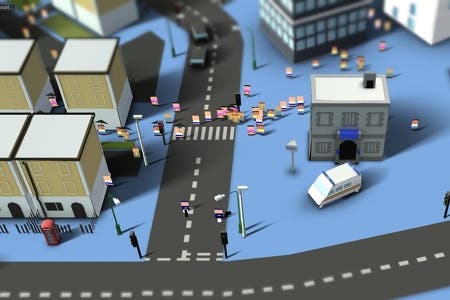Wildfire Worlds Preview: Occupy Trumpton!
"I was watching the London riots on telly when I suddenly thought: I want to play that."
"I was watching the London riots on telly when I suddenly thought: I want to play that."
James Boty's the creator of Wildfire Worlds, and Wildfire Worlds is one of the most interesting things I've seen in years. It has a central concept few game designers would choose to engage with openly, and, as Boty's just revealed, an origin story that even fewer would ever admit to.
"It's wrong, I know," says Boty, when I come to his Soho animation studio on a rainy Monday in early July. "It's so wrong, but I'm a middle-class, middle-aged man with confused politics. I know violence is wrong, I know that people should be free, but at the same time I'm strangely attracted to the senselessness of gangs going into Foot Locker, and then robbing Foot Locker. There's no obvious politics to it, but I suppose it's the politics of poverty underneath it all."
He laughs. "Then the South Park in me comes out. I find it funny, absurd. I sit in my house getting furious about the bankers, and I kind of side with the teenagers more than the establishment - even though, to them, I'm probably the enemy. All of that confused stuff comes together." Boty pauses and gestures across the office. "And Mike definitely has the same thing: you want to burn it all down, right?"
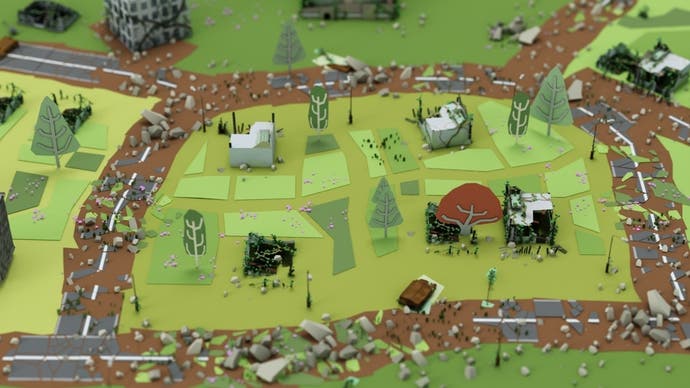
"Everything," agrees Mike, good-natured, arms folded. "Everybody. This isn't just spiel. We made this game because we want to do it. I want to do it for real, up in the clouds, pointing at things with my god finger. This is the next best thing."
Mike is Micheal Micheal, the co-founder of PomPom games. That's the team behind squeamish arcade classics like Mutant Storm Empire and Alien Zombie Death. Together with the other PomPom co-founder, Miles Visman, who's present at our meeting, but significantly less vocal, Michael's been working with Boty to get Wildfire up and running.
And Wildfire itself? Wildfire's complex and exciting, and it's still taking shape. It's a toy and a simulation as well as a game, and I can't stop thinking about it. I've actually dreamt about it, too, the way I often dream about Minecraft.
The idea's pretty simple to get your head round: launch Wildfire on a PC or iPad, and you'll be greeted by a sweet little cardboard town, covered with a voguish tilt-shift effect and basking in a quiet sense of prosperity. It's London blended with Trumpton, and it's all so busy: cardboard people scurry between cardboard buildings, cardboard traffic waits patiently at cardboard crossings, and when night falls, the sky turns a deep dark blue, and golden cardboard lights come on in all the windows.
"But games? Games are like fine art, and games people don't understand that. The indie people do: they know it's better than fine art. They know it's interactive and wonderful they're all sharing."
James Boty
I could watch this thing for hours, following the people as they swarm and mass, obeying their own little behavioural routines that take them to work, to the shops, to the park. Look closer and you get a sense of how deep the simulation is: the traffic can form actual jams, and people take the quickest route home when they leave the office, getting on buses, heading for the tube.
When rain falls, they bring out umbrellas. When something breaks, a little cardboard engineer pops up in an orange vest and tries to fix it. Every so often, a cardboard cop car rolls past, or maybe even a cardboard fire engine. A stray wind ruffles the cardboard trees. Maybe I just imagined that last bit.
If that was it, I'd still be hooked. But that isn't it. Not at all. Click a mouse or jab the touchscreen and you can start to mess things up, dropping angry activists into this dainty little cardboard paradise. Occupy Trumpton! The activists go berserk, laying into buildings and traffic, and winning other citizens over to their cause - or inspiring them, to use the correct terminology. Remember when you first saw Minecraft and realised somebody had made a game all about Lego? Wildfire is the same thing, except it's not Lego but epidemiology you'll be playing with. Other games have done things like this, of course, but this seems so much more immediate.
So what's the basic pitch? The easy sell would be that it's SimCity with all the difficult stuff cut out. You don't have to create your metropolis from the street plans upwards - you just have to enjoy watching it burn. That doesn't capture the complete appeal, though, because destruction here seems like an inherently creative process. Wildfire feels like an art tool in which you paint with civil disobedience, and whether you micro-manage and place hundreds of activists or settle for a single guy and then sit back to see what he does over the course of a few hours, you'll always end up with a different picture.
Playing with the cheats on
Boty's been circling games for years. "I like games, but I can't handle them," he says. "They're so hard! So I cheat a lot. I cheat playing hardcore games, like Company of Heroes. With the cheats on all the time, it's just toy soldiers. I loved it! Then there's Wild Metal Country, which is just perverse. I'd like to go on record for this: I think the people who made Wild Metal Country are geniuses. The only fan emails I've ever sent are to the programmers who made that. The game had robots and an AI system, basically: the enemy was a coherent AI. I love that idea: things fighting each other and the game just working."
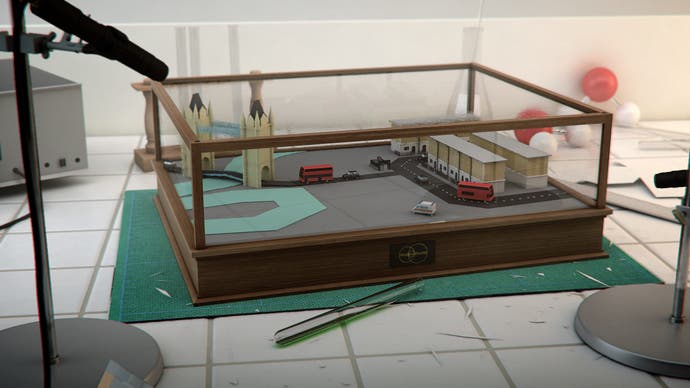
What is it about games that draws Boty in from the safety of his own creative industry? Good news, designers: it's envy. "I've worked in advertising for years, and everyone's very lovely," he says. "But games? Games are like fine art, and games people don't understand that. The indie people do: they know it's better than fine art. They know it's interactive and wonderful they're all sharing.
"They're hippies, basically, There's a bunch of hippies in games, and it's lovely. That's what I want to make. Proteus, Fez. Fez? It's just beautiful. And the hit rate of interesting stuff in games is so much better than film. The undercurrent is amazing: it's the most arty scene I've ever seen. Arty's probably a dirty word. It's vibrant, and I just want to get in on that."
Boty's got in on it before, as it happens, but a stint at EA Bullfrog left him disillusioned and bored. "I worked there because I loved Syndicate and Magic Carpet and all of that. When I got there it was in the EA phase, though, and although they were lovely people, they were making all this triple-A stuff and everything was going to take too long. I'm very impatient.
"I left after about two years and dragged somebody from there with me. I got into animation and that became the career, but all this time I've been ruminating on stuff. Last year I did a little app called Zombigotchi, which was just an excuse to hire coders. The next stage was to get proper game people in. I want to make a game. Mike and Miles have such odd sensibilities. When I said, 'I want to make a game about infectious diseases spreading across the world, and I want to be the infectious disease,' they said: 'yeah!'"
This is civilisation
The trio quickly formed Dot Product, and have been putting Wildfire together over the last six months, working with an additional team of about five. On the day I visit, I get to spend about an hour playing with the latest build on a PC, and the potential of the thing is almost overwhelming. One minute in, my town's tidy and productive. Five minutes later, and it's burning to the ground.
A quarter of an hour on from that, and the activists I've placed have already started running out of pedestrians to win over, and that means they've started to explode. They're as impatient as Boty himself, it would seem, and maybe as hippyish, too. After all, they're leaving behind pools of blood with little green flecks in it, and around the 45-minute mark, the green flecks have birthed creepers, and the creepers are turning into trees.
When my hour's up, the forest has reclaimed the city. Boty has a plan for what happens next, too: the animals regress to dinosaurs, and the dinosaurs leave piles of dung. From the piles of dung leap - what? - bankers! Of course! And civilisation starts to take over once more - all ready for you to smash it up afresh.
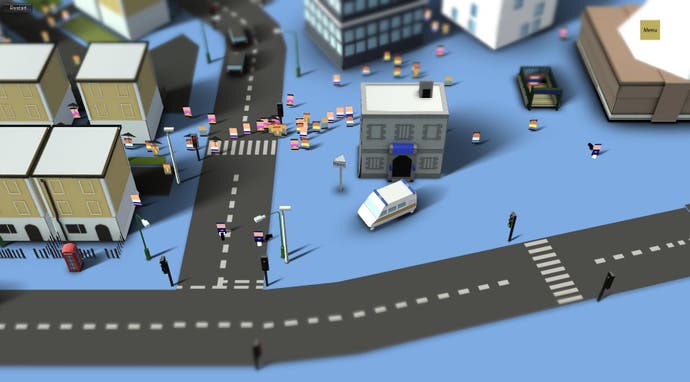
That's one possible Wildfire journey, of course, and the details are still being argued over. "Regressing to dinosaurs?" winces Visman. "That doesn't really make much sense, does it?" Whatever, shrugs Boty: it's far from being the only journey available. As the game's built around simulating coherent systems, lots of pleasantly incoherent things can happen. You plan your AI, and then the unplanned emerges when the rules you've laid down all jumble themselves together.
Case in point? Cops committing suicide. "That's not scripted!" pleads Boty, who seconds ago was chuckling with Michael about releasing the Vatican as DLC. "That whole thing just emerged. It just happened that my activists were hiding around the edge of a building and the cops turned up. We'd just put a new thing in where the cops can throw grenades. They're chucking grenades around, one bounced off the house, bounced back, and blew up all the police. Then the activists were unharmed and went on and destroyed everything."
"There's so many people who are going to look at it and not be able to see all the little systems. That's why we're putting in actual levels to complete. I want people to know what's going on."
Michael Michael
Just a typical day in Wildfire, then. Here's another. "Attack a car and you get these burnt out shells, which is one of my favourite symbols of the London riots," says Boty. "They look rather pretty when the flowers start to grow through the chassis. Anyway, this isn't scripted either: the police were shooting at the activists, and they get a ruined car, and then they push the car towards the cops, using it as a shield. They came around the side at the last minute and infected the coppers and turned them into activists."
Two last stories about my visit to Wildfire. In the first, night falls, and my activists attack a power plant. The plant erupts and electricity is knocked out for a huge chunk of the city. Pedestrians move quickly beneath street lamps because they know where they're going. With the lamps down, they start to go nuts, making it all the easier for me to swarm in and win them all over.
In the second, Boty's trying to show off the fire propagation system, so he loads up one of Visman's saves and sets his activists upon a building. The building flickers into flame, but Visman likes to play the game in a very particular way: he's dialled down the power of the activists, and he's dialled up the power of the cops. The cops arrive and start blasting everyone to pieces, and the people inside the building start putting out the fire. For 15 minutes we cluster round the screen and it's just - gah! - stalemate. The flames build up, then they start to decrease again. Up, down, up, down. Eventually, after chucking in a load more activists, a car crashes into the building and the whole thing falls. Phew.
Power without responsibility
Wildfire's brilliant fun to mess around with, then, but the team admits that it isn't quite sure what it really is yet - or how to release it. Both issues are tightly intertwined, and over course of my visit, Boty and the PomPom men fire questions back and forth constantly. How much to give away up front? How to layer in monetization? What should the first release look like? How much handholding should the team provide?
"It's so overwhelming," says Michael. "There's so many people who are going to look at it and not be able to see all the little systems. That's why we're putting in actual levels to complete. I want people to know what's going on - to look at it and understand what's actually happening in the simulation and to introduce each system - ambulance service, police, electricity - one at a time. I don't want to alienate a proportion of people who won't be able to understand it."
It's got levels? "Yeah, it's got levels," says Boty. "Our first level is where you see just people, and you put your finger down and they become inspired to activism. Then we've got levels with a house and work, and they travel between the two on a cycle, and you've obviously got to break the cycle.
"Also, they retreat into the houses when it's night and that sort of thing, and you have to have enough force and enough people on your side to knock down the house. We're building up the systems. I can tell that Miles is of the mind to say, "Here's the world, screw it up," and Mike's got his game design head on instead. I'm kind of in the middle.
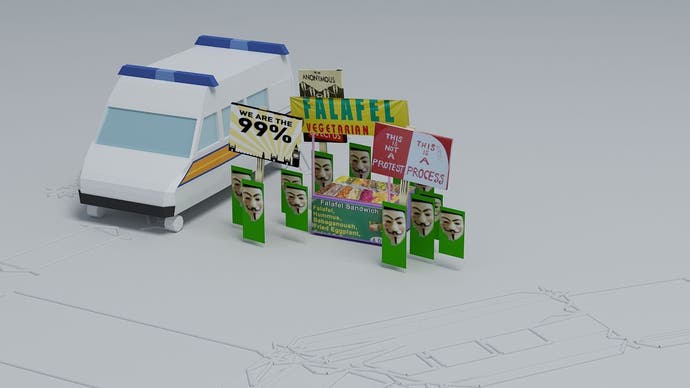
"To me, it's a propagation engine. It's about the spread of disease, ideas, anything. We could have levels where you have an oppressed village and literacy breaks out, or where it takes twenty of your guys to sacrifice himself to make a soldier stand down. This does happen. Soldiers do turn. They have morals." He laughs. "And we can do all of this with sliders!"
So it's not that Wildfire's struggling to become a game, then - it's that it could be almost any kind of game at the moment. In the space of five minutes, Michael suggests ideas that could see it as a puzzler, an action adventure, or a comprehensive RTS (this last one is brilliant, incidentally, and involves limiting the number of activists you can place at any one time).
Multiplayer, DLC, payment model? All up in the air when I visit. At the moment, though, the team's at least committed to a basic plan: delivering a sandbox city, a selection of levels to orient players, and sliders that allow more inquisitive minds to then mess with the variables.
"To me, it's a propagation engine. It's about the spread of disease, ideas, anything. We could have levels where you have an oppressed village and literacy breaks out, or where it takes twenty of your guys to sacrifice himself to make a soldier stand down."
James Boty
The sliders are where it's at, if you ask me, allowing you to nerf the police, dial up the rate at which buildings catch fire, and fiddle with all manner of other weird elements. They tie into my favourite aspect of the project, too, which is that the player can do as much or as little as they want to in this world and the results are still worth watching.
The team's committed to listening to the community, too, and incorporating feedback. "That's what I keep saying," says Michael. "Whatever people want, we'll do it. No matter how rubbish the ideas are, if they want to do that with the game, we'll make it happen." (At the very least, Wildfire should have two basic components on or near launch, I suspect: the ability to export to YouTube in-client, and a level editor that allows players to create their own cities and share them around. This last one's tricky, of course, but the developers are aware of its importance.)
Whatever happens to Wildfire before its release - or even afterwards - it would be a shame to see too much of its bold, even heroic, aimlessness eroded, though. If you're going to be playing the game at five in the morning, bed sheets bunched around you and tea going cold on the nightstand, it's going to be the sheer playfulness of the thing that's hooked you in. It's going to be the fact that you've been messing around for six hours straight, making things up as you go, and now you can't quite pull yourself away. As long as that survives, Dot Product could be onto something special.
If it dies? If it dies, there could be a riot.
